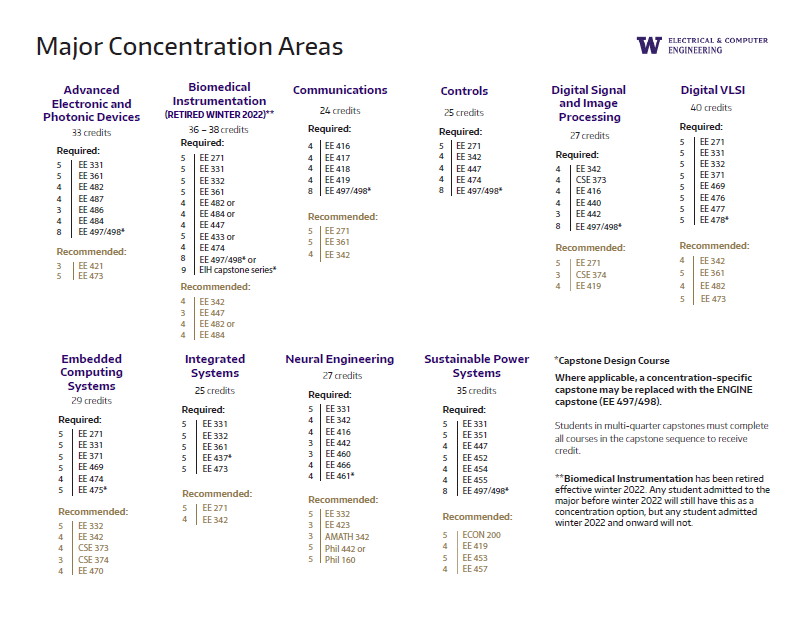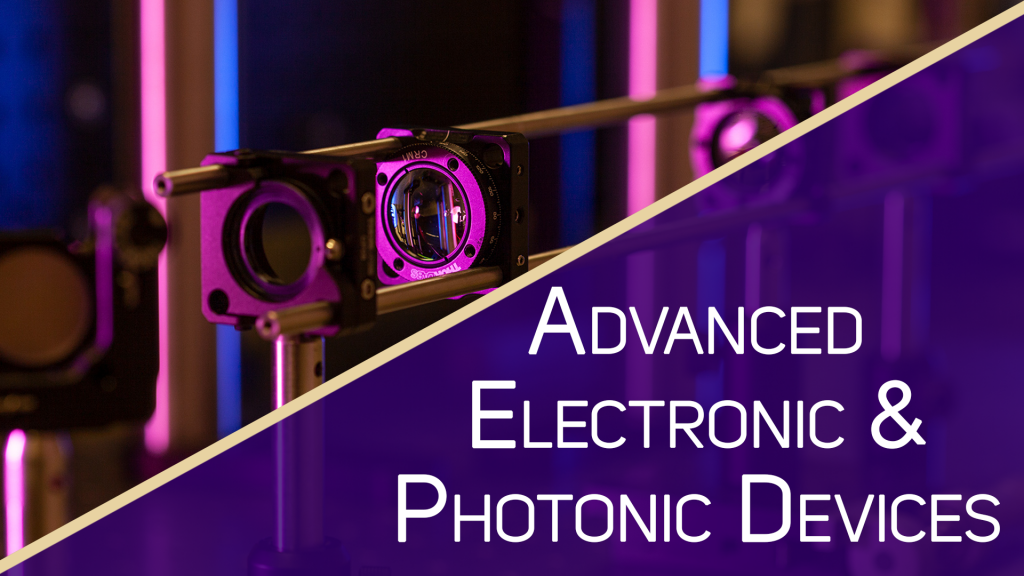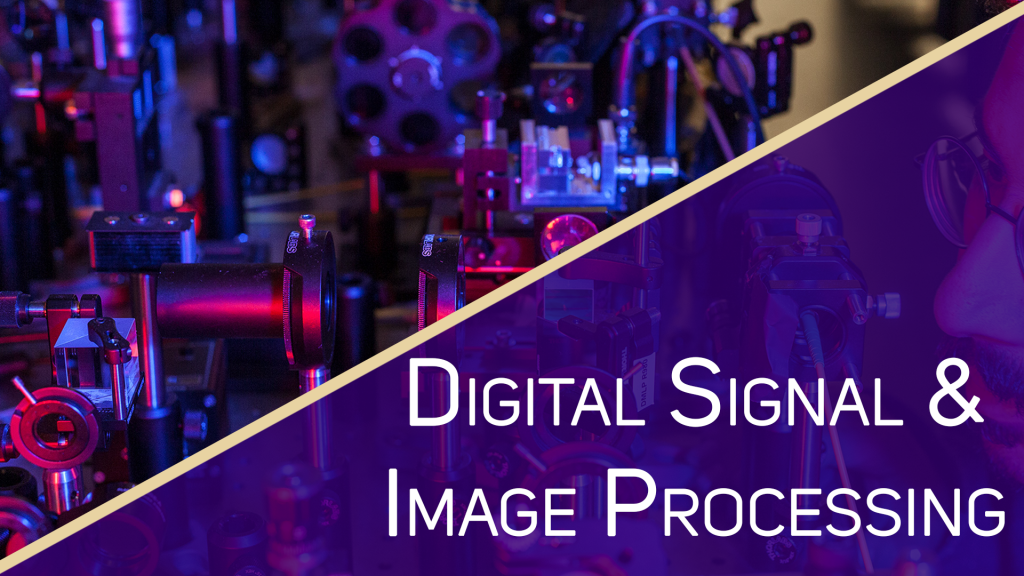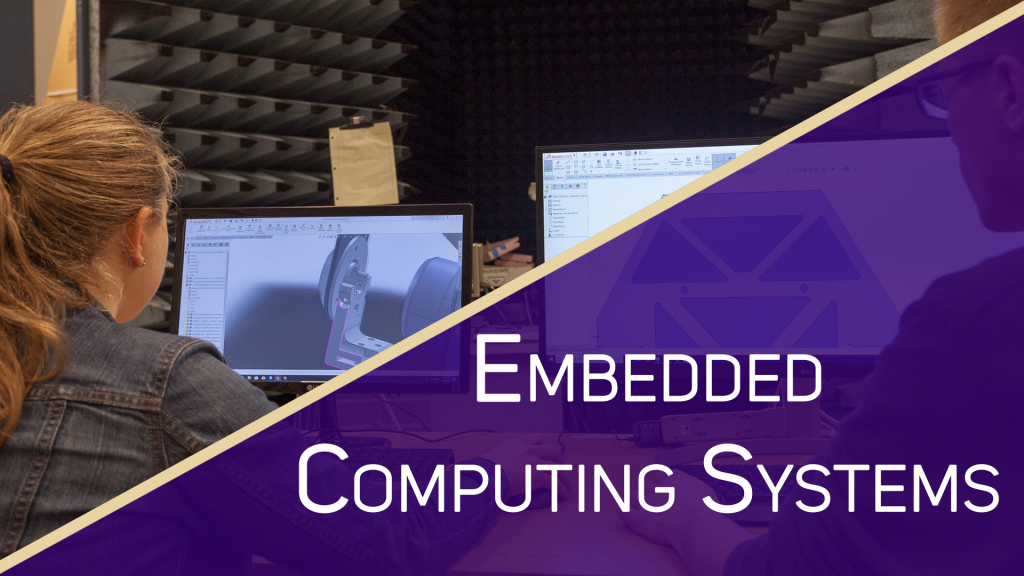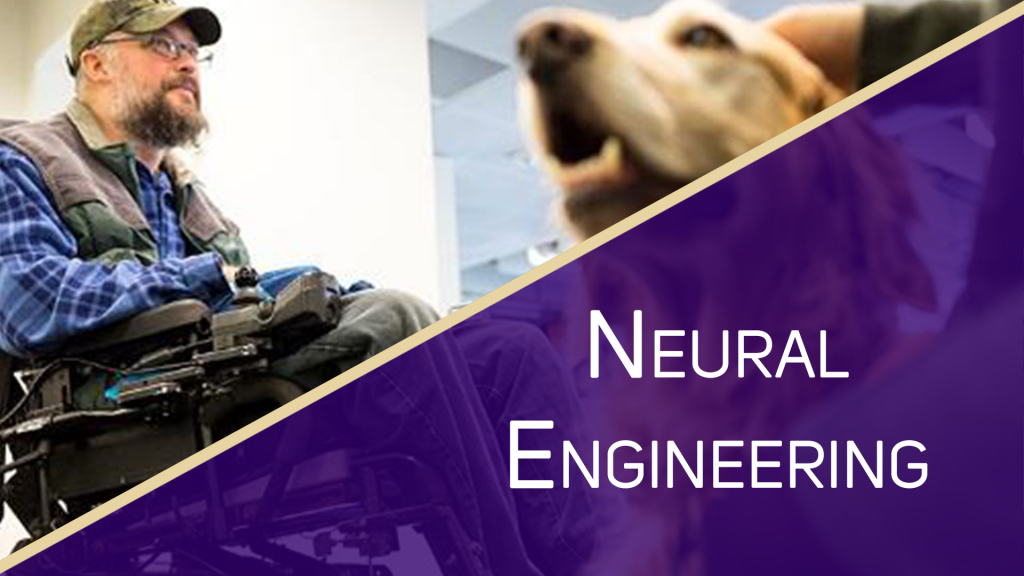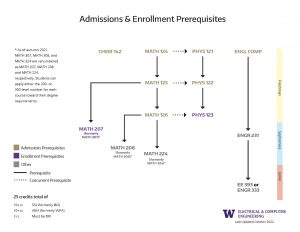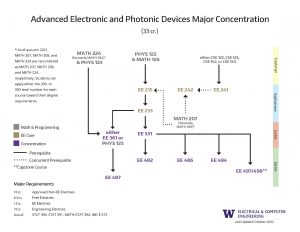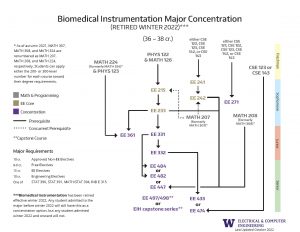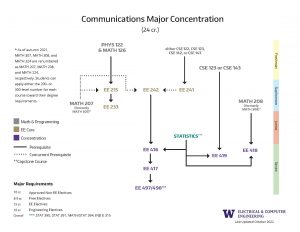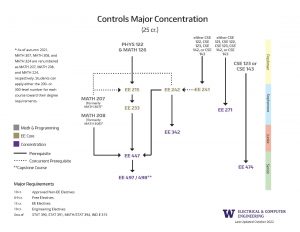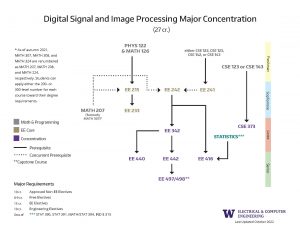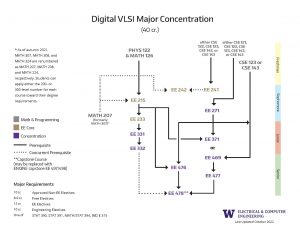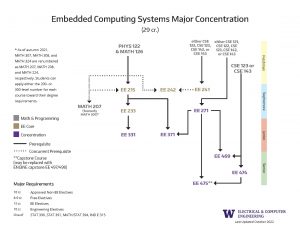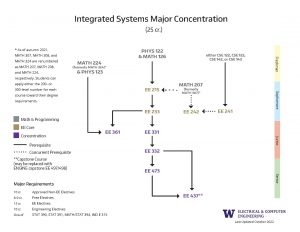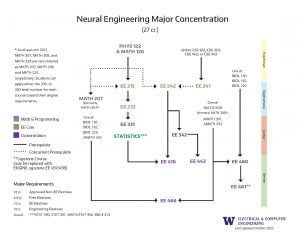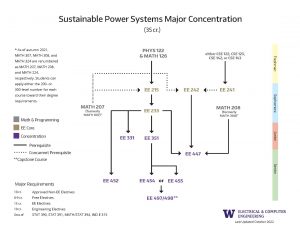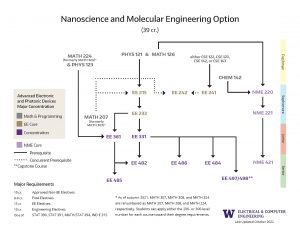UW ECE’s Bachelor of Science in Electrical Engineering (BSEE) degree prepares undergraduates for careers in industry or further study at the graduate level. BSEE degree requirements include UW general graduation requirements as well as EE prerequisites and curriculum.
Please note: Autumn quarter 2023 was the final admission cycle for the BSEE degree. Beginning autumn quarter 2024, the BSECE will be the only degree available for undergraduate admission.
BSEE Degree Requirements
- A minimum of 180 credit hours of coursework
- A minimum of 45 credits earned in residence at UW
BSEE Coursework Requirements
Students must complete coursework in the following three areas:
1. BSEE Major Requirements and Electives (119-121 credits)
The BSEE major requirements are comprised of the following areas of study:
Mathematics (24 credits)
- Calculus with Analytical Geometry (1, 2 and 3)
- MATH 124
- MATH 125
- MATH 126
- MATH 207 (formerly MATH 307)* Introduction to Differential Equations OR AMATH 351 Introduction to Differential Equations and Applications
- MATH 208 (formerly MATH 308)* Linear Algebra OR AMATH 352 Applied Linear Algebra and Numerical Analysis
- MATH 224 (formerly MATH 324)* Advanced Multivariable Calculus
* As of autumn 2021, MATH 307, MATH 308, and MATH 324 are renumbered as MATH 207, MATH 208, and MATH 224, respectively. Students can apply either the 200- or 300-level number for each course toward their degree requirements.
Statistics (3-4 credits)
Choose one of the following classes:
- STAT 390 Probability and Statistics in Engineering and Science
- STAT 391 Quantitative Introductory Statistics for Data Science
- MATH/STAT 394 Probability I
- IND E 315 Probability and Statistics for Engineers
(Students taking 390 or 391 will earn one more credit than necessary for this requirement. Excess credit will apply to Free Electives.)
Sciences (20 credits)
- PHYS 121 Mechanics
- PHYS 122 Electromagnetism & Oscillatory Motion
- PHYS 123 Waves
- CHEM 142 General Chemistry
Computer Programming (4 – 5 credits)
- Either CSE 123: Intro to Computer Programming III or CSE 143: Computer Programming II
Electrical Engineering Core (14 credits)
- EE 215 Fundamentals of Electrical Engineering
- EE 233 Circuit Theory
- either EE 235 Continuous Time Linear Systems or EE 242 Signal Processing I (EE 235 has been replaced by EE 242 starting with the autumn 2021 quarter)
Electrical Engineering Major Concentration Area (24-40 credits)
Students must select at least one of several major concentration areas to focus their studies. Please view the Major Concentration Areas Chart and related Concentration Prerequisite Flowcharts for more information.
Professional Issues Course (1-4 credits)
All students are required to take a professional issues ethics course. This requirement covers issues relating to professional development, ethical dilemmas and societal expectations of engineers. Students may choose from the following courses:
- EE 397
- EE 398
- EE 406
- EE 418
- EE 456 (Not offered after Spring 2022)
Please see a UW ECE adviser for a list of the most current course options. EE 398 is not considered a seminar and thus does not apply to the 2-credit seminar limit (see below).
EE Electives (4-25 credits)
In addition to the Electrical Engineering Core and Concentration Area courses, students must take additional EE courses so their total EE credits equal or exceed 58 credits. Note that the Advanced Technical Communication course (EE 393 or ENGR 333) does not apply to EE or Engineering Electives. The Professional Issues course does apply to EE Electives.
Below are a few non-traditional coursework EE elective options:
- Engineering Internship Program
The Engineering Internship Program provides students with meaningful experience in industry, which can help guide their remaining studies. Students enrolled in the internship program have full-time or part-time paid employment while earning academic credit. Electrical & Computer Engineering students may earn up to 2 credits per quarter (ENGR 321) and apply up to 4 credits (ENGR 321) toward their degree as Engineering Electives or EE Electives. A student may apply no more than 12 credits in total of ENGR 321, EE 499, ENGR 297 or 497 or independent study courses in other departments towards their degree requirements.
- Undergraduate Research (Independent Study)
EE 490/499 Approval Form (required)
Students may apply up to 10 credits of EE 499 Special Projects work to the EE Electives requirement. This represents research or a design project carried out under the supervision of a faculty sponsor. Students may register for between one and five credits each quarter; the precise number of credits is determined by the student and the faculty supervisor and is dependent on the amount of work to be carried out. Each credit generally represents between three and five hours of work each week. To register for these credits, please pick up an “EE 499 Approval for Undergraduate Research and Special Projects” form from the Advising Office, obtain a faculty signature and return the form to Advising for an entry code. Students may apply a maximum of 12 research credits, subject to course maximum credit limits and individual area limits, to EE elective, non-EE elective or COE elective requirements. Students may also register for EE 490, which is CR/NC. EE 490 does not apply to any EE degree requirements.
Additional College of Engineering Electives (10 credits)
Students must earn an additional 10 credits in technical courses from departments in the College of Engineering (COE). These credits may come from EE, another COE department or a combination of COE departments. The courses must be at the 200-level or above, with the following exceptions:
The following courses DO count:
- MSE 170 Fundamentals of Materials Science
The following non-EE research courses need ECE adviser approval in order to apply toward COE elective requirements:
- AA 299, 499
- CHEM E 499
- CEE 499
- CSE 498, 499
- HCDE 499
- IND E 499
- MSE 497, 499
- ME 495, 498, 499
The following non-EE research courses do not need approval in order to apply toward COE elective requirements:
- ENGR 297, 497
Students may apply a maximum of twelve research credits to the EE Electives, College of Engineering Electives and/or Approved Non-EE Electives requirements. The sum of the credits from the EE Core, EE Major Area, EE Electives and COE Electives must equal or exceed 68. Please note that the credits do not take the place of the Approved Non-EE Electives requirement.
Seminar Courses Applied to Required Credits
Students may apply a maximum of two seminar credits to the EE Electives, College of Engineering Electives and/or Approved Non-EE Electives requirements. Seminars are considered any course structured as a seminar (typically 1-2 credits), regardless of whether they are graded or CR/NC. EE 398 is not considered a seminar and thus does not apply to the 2 credit seminar limit.
Possible EE seminars include:
- EE 200 Undergraduate Research Exploration Seminar
- EE 491 Undergraduate Seminar – Departmental Colloquium
- EE 492 Electrical Engineering Leadership Seminar
- EE 500 Graduate Seminar
- Some EE 500 seminars may not be open to general enrollment, so please check with the responsible faculty member to determine if the seminar is suitable and you can enroll in it.
Seminars offered by other departments may be counted towards the appropriate class of elective credit, subject to the maximum two credit limit.
Graduate Courses Applied to EE Electives
Under special circumstances you may petition, as an undergraduate, to apply up to 4 credits earned in graduate courses toward your minimum 58 required EE credits. Before such a request can be approved, you must demonstrate that you have the required background for the graduate courses. Consult the UW ECE Advising Office for additional information about the petition process.
EE graduate seminars (such as EE 500) do not require petitions and are not subject to the 4 credit graduate course limit. However, graduate seminars are subject to the 2 credit seminar limit.
2. General Education Courses (47 credits)
General Education Courses are comprised of three areas of study: written and oral communications courses; approved non-EE electives; and arts & humanities and social sciences courses.
Written and Oral Communication (12 credits)
This requirement includes two components described below: English Composition and Additional Writing Requirements.
English Composition
At least 5 credits of English Composition must be taken from the UW’s approved list of composition courses. These courses include:
- C LIT 240 (5) Writing in Comparative Literature
- ENGL 109, and 110 Introductory Composition (both courses must be completed to receive credit, but you may only apply 5 credits to the BSEE degree)
- ENGL 111 Composition: Literature
- ENGL 121 Composition: Social Issues
- ENGL 131 Composition: Exposition
- ENGL 182 The Research Paper
- ENGL 197 Interdisciplinary Writing/Humanities
- ENGL 198 Interdisciplinary Writing/Social Sciences
- ENGL 199 Interdisciplinary Writing/Natural Sciences
- ENGL 281 Intermediate Expository Writing
Note: If you have transfer credit that is similar to the courses above, but which did not transfer as one of the courses listed above, please check with the ECE Advising Office.
Additional Writing Requirements
- ENGR 231 Introduction to Technical Communications (3 credits) or at least 3 credits of “W” coursework
- EE 393 Advanced Technical Communication or ENGR 333 Advanced Technical Communication in the Engineering Workplace (4 credits)
Approved Non-EE Electives (10 credits)
Any course offered at the University of Washington numbered 200 or higher may be used for this requirement with the following exceptions:
- Courses cross-listed with an EE course.
- Courses in the BEE and TEE curricula.
- Courses required for the degree, such as MATH 207, 208, 224 (formerly MATH 307, 308, 324) *, ENGR 231, etc.
- Any independent study course.
- Seminar courses are subject to the 2-credit seminar limit across Non-EE and 68 credit total area.
- The following courses at the 100 level may be counted:
- BIOL 130, 180
- CHEM 152, 155, 162, 165
* As of autumn 2021, MATH 307, MATH 308, and MATH 324 are renumbered as MATH 207, MATH 208, and MATH 224, respectively. Students can apply either the 200- or 300-level number for each course toward their degree requirements.
Arts & Humanities (A&H) and Social Sciences (SSc) (25 credits)
A total of 25 credits are required, with a minimum of 10 credits in each separate area. A&H/SSc (formerly known as VLPA/I&S) courses are designated in the quarterly time schedule and the UW course catalog. A minimum of 5 credits of diversity (DIV) coursework is required. The DIV credits may overlap with A&H or SSc. Special Note: For students admitted to the University prior to autumn quarter 2023, the DIV requirement is 3 credits.
3. Free Electives (12-14 credits)
Free elective credits may be fulfilled by any courses for which the University of Washington gives credit, except courses that duplicate or parallel courses for which you have already received credit.
Nanoscience and Molecular Engineering Option
The Nanoscience and Molecular Engineering (NME) Option, offered by UW’s Molecular Engineering & Sciences Institute, provides undergraduates an excellent opportunity to explore nanoscience and molecular engineering while completing their BSEE. The NME option integrates nanoscience and molecular engineering into the existing electrical engineering undergraduate curriculum.
Admission
Students may apply for admission to the NME option during winter quarter of their junior year. To declare this option, students must schedule an appointment with an ECE undergraduate adviser.
Prerequisites:
- Completion of NME 220 with a minimum grade of 2.0
- Completion of all electrical engineering prerequisites
- Admission to the BSEE undergraduate program.
Degree Requirements
Unless otherwise specified, students completing the NME option must complete the regular BSEE Degree Requirements. Students are also required to complete six credits of NME core courses, the Advanced Electronic and Photonic Devices or Neural Engineering concentration and additional College of Engineering electives.
Nanoscience and Molecular Engineering Degree Option (6 credits)
- NME 220 Introduction to Molecular and Nanoscale Principles
- NME 221 Nanoscience and Molecular Engineering Seminar I
- NME 421 Nanoscience and Molecular Engineering Seminar III
Major Concentration Area (24 credits minimum)
The approved concentration area for the NME Option is Advanced Electronic and Photonic Devices or Neural Engineering. Any capstone course project must be on a topic appropriate for NME.
Students may also wish to consider the following courses in addition to their concentration.
- EE 423 Introduction to Synthetic Biology
- EE 424 Advanced Systems and Synthetic Biology
- EE 425 Laboratory Methods in Synthetic Biology
- EE 436 Medical Instrumentation
- EE 486 Fundamentals of Integrated Circuit Technology
- NME 321 Nanoscience and Molecular Engineering Seminar II
- NME 498 Special Topics in Nanoscience and Molecular Engineering
- BIOEN/CHEM E 490 Engineering Materials for Biomedical Applications
- BIOEN/CHEM E 491 Controlled-Release Systems: Principles and Applications
- BIOEN 492 Surface Analysis
- CHEM E/BIOEN 467 Biochemical Engineering
- MSE 481 Science and Technology of Nanostructures
Credits earned for these courses will count toward additional ECE electives, additional College of Engineering electives or approved non-ECE electives, provided that the course meets requirements.
Additional College of Engineering Electives
The six credits earned from the NME core courses reduce the credits required in this category from 10 to four.
Seminar Courses Applied to Required Credits
NME 221, 321 and 421 do not apply to the two-credit seminar limit.
Concentration Information
Concentration Handouts
(Click images below to view concentration PDFs)
Concentration Prerequisite Flowcharts
Click below to see individual major prerequisite information
Admissions & Enrollment
Advanced Electronic and Photonic Devices
Biomedical Instrumentation (RETIRED WINTER 2022)
Communications
Controls
Digital Signal and Image Processing
Digital VLSI
Embedded Computing Systems
Integrated Systems
Neural Engineering
Sustainable Power Systems
Nanoscience and Molecular Engineering Option
Contact Advising
- undergradece@uw.edu
- Current ECE students can schedule an appointment with an adviser online.
- Prospective student drop-in hours


